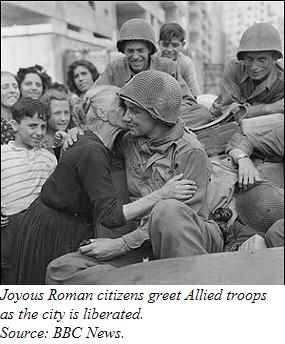Koch knew the Germans would soon loose power of Rome. He also knew exactly what would happen to him if Italian resistance fighters got their hands on him—probably his own tortures would pale in comparison. Koch was willing to take his chances at getting away. But he could not risk taking his wife and mother with him. And if they were found in Rome, the Italians would see them as convenient scapegoats, and kill them just as easily.
So Koch was asking O’Flaherty to smuggle them to safety.
Even O’Flaherty was taken aback. The man who had publicly outlined the tortures he had waiting for the Irish priest was now asking for help? Koch was, of course, ready to bargain. If O’Flaherty would save his family, Koch would make sure that the captured organization members were left behind in Italian prisons and not transported to Germany. And they were left—except for a small group, who were trucked about 14 miles outside the city, and then shot. O’Flaherty, for his part, made arrangements for Koch’s wife and mother to be taken to Naples and sheltered in a convent. The two women ultimately chose not to go, but O’Flaherty had kept his word to the Torturer of Rome.
 On June 3, Vatican radio picked up a call from a British spearhead division that had reached the Pope’s summer villa, some 30 km outside of Rome. Derry radioed back with the military situation of the city. German troops were simply pulling out. They were still shooting, still threatening, still stopping citizens and demanding to see identity papers, but the end was coming.
On June 3, Vatican radio picked up a call from a British spearhead division that had reached the Pope’s summer villa, some 30 km outside of Rome. Derry radioed back with the military situation of the city. German troops were simply pulling out. They were still shooting, still threatening, still stopping citizens and demanding to see identity papers, but the end was coming. At 7:15 p.m. on June 4th, the Allies entered Rome. They were greeted by cheering crowds. Many of the people Kappler had arrested a few months earlier simple walked out of the prisons. The refugees and their padrones planned huge parties. Sir D’Arcy, Derry, and John May watched from the roof as St. Peter’s Square filled with thousands of thankful people and Pope Pius appeared on his balcony to bless the city. And O’Flaherty?
“ ‘Well my lad there is work to be done,’” Sam Derry recalls the Monsignor saying. “And off he went into the City to visit some of our helpers and their relations who had suffered so much as a result of their activities on our behalf. In the evening he was back in the British Legation to see the Minister and myself with a list of requests for immediate action, some of which were not so easy to meet, considering the general chaos in Rome immediately after the liberation.”
To O’Flaherty, the liberation meant only an end to some of the hardships. Victory, triumph, conquest—these things mattered little to him, even if it was he and his friends who could claim them. Sometime in his life, somewhere in his heart, O’Flaherty had made a promise to come to the aid of anyone in need, no matter their nationality, no matter their religion, no matter whose side they were on. Now that the tide of war had turned, it was no longer the Allies and the Jews who needed help; it was the Italian Fascists and the Germans.